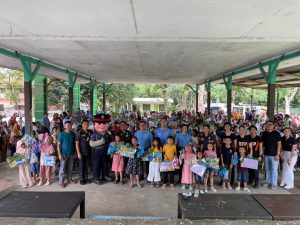On April 12, Friday, the first ever Senior High debate between detainees under the senior high curriculum of the Social Entrepreneurship Technology and Business Institute Inc. (SETBIFI) against their sister school Thompson Christian School was held at Ma-a Davao City Jail.
The Senior High School program was launched in school year 2018, through the initiative of Dr. Aland Mizell, the President of SETBIFI, with the Bureau of Jail Management and Penology (BJMP), and the Thompson Christian School. The program offers the requisite Senior High School education for detainees who graduated from the old high school curriculum to enable them to advance to the College Education behind Bars (CEBB) program, launched in the year 2017, in partnership with University of Southeastern Philippines (USeP).
The SETBIFI partnered with the Thompson Christian School (TCS) to provide the curriculum as well as the faculty members for the senior high school program. After finishing this two-year program, the student detainees will become graduates of TCS.

The debate, which coincided with the conclusion of its successful first school year, centered on the issues of recidivism and political dynasties. The adjudicators were: J Insp. Francisco Corpuz, the Deputy Warden of Davao City Jail, Grace Meraflor Lantajo, PhD, USeP professor of Political Science and, Mr. Amado Munda of the Tabula Rasa artist group.
A palpable sense of anticipation tingled in the air as the detainees, faculty members, and students of TCS await the start of the debate. The nervous excitement of the entire Grade 11 class of SETBIFI charged the whole room with a restless energy, adding in the presence of the media.
The debaters from TCS and SETBIFI argued over the subjects of Recidivism and Political Dynasties. The students of TCS were well composed as they delivered valid points while their opponents, the SETBIFI, retorted with reverberating conviction as it becomes apparent that the issues discussed were deeply related to their experiences. The winner of the debate on Recidivism is the TCS while the SETBIFI won the debate on Political Dynasties.
The debating team from TCS was composed of Ulysses Gubantes, Enoy Gryck, Amalia Tabogoy, Zoe Magbanua, Shyra Habail and Knives Sabellano.
Representing SETBIFI were: Keith Altiso (Best Debater), Julius Bancure (Team Captain), Abdulrauf Ali, Pamela Sampiano, Welma Gera, and Arcelyn Aplasin.
“It was very fun. It was a blessed experience,” said Zoe Matthew Magbanua, one of the debaters from Thompson Christian School. Zoe said that he was not at all intimidated by their detainee opponents for they were all very cordial throughout the duration of the event.

For the SETBIFI students, the debate was a chance to engage with people outside the walls of prison.
Keith, named as the best speaker of the debate, said that his knowledge on political dynasties is based on their discussions in class and a little bit from what he saw in the media from the past. This 27 year- old student detainee has served three years in prison and is waiting for his release anytime soon. He described his life in prison before the SETBIFI was established as monotonous.
“All we do is eat, sleep, and wait for the headcount after the shift of the guards,” Keith said. He thought he has lost interest to study again after dropping out of school due to the influence of friends. By the time he gets out of prison, he wants to continue his education and fulfill his dream to become a lawyer.
The debate not only left an impact on the debaters themselves, but also on the audience. The detainees who got to witness the exchange of arguments were in awe of their classmates and the outsiders who challenged them. One inmate, a 28 year-old woman charged for drug possession, expressed how much optimism was bestowed on her and her fellow detainees while watching her yellow-clad classmates exchange points with the outsiders in this exercise of intellect.
“This (debate) proves that we are more than just detainees. We are capable of doing more,” she said when asked what the exercise meant for her. She also expressed her gratitude towards the people behind the debate and the Senior High program. She has hopes that another batch will be coming in after them, and that more inmates may be given the chance to be accepted in the learning program. She later reiterated that going to classes made her more hopeful about life outside as she is now inspired with prospects of a dream profession.
At the end of the activity, both the participating detainees and the students from Thompson Christian College came out as winners; both parties having earned fresh outlooks from what can be called a singularly unique experience.
The primarily anxious atmosphere around the SETBIFI’s Grade 11 class was supplanted with cheer and good humor as the debate ended and the school year came to a close. People in yellow were shaking hands with the visitors as they congratulate each other over the success of the event.
The educational programs of the SETBIFI challenge the way most people see prisons. As Dr. Mizell stressed in his opening remarks, prison is not just for punishment it can also be a tool to help reform people and give them the chance to be better and realize their potential. It is sweet to envision such a humane system being replicated throughout the country en masse.
By Daphni H. Madelo and Maria Concepcion O. Lim – USeP Interns



